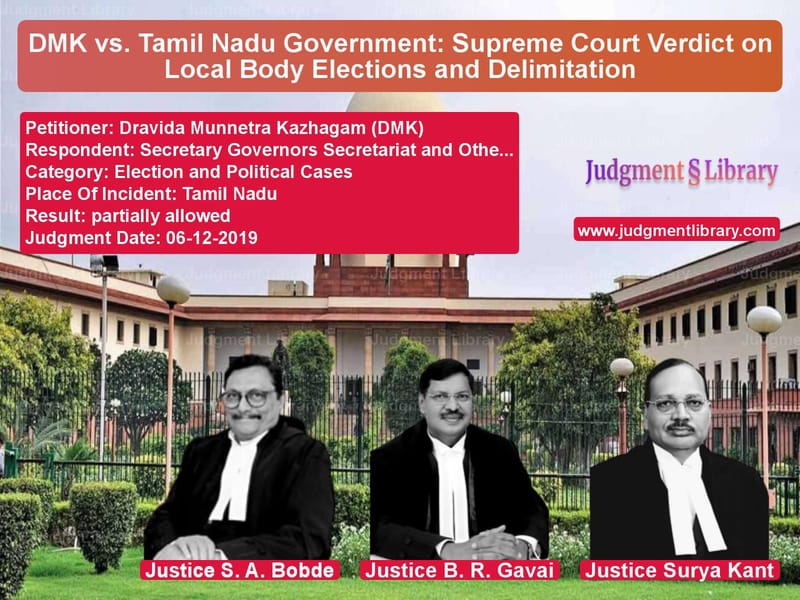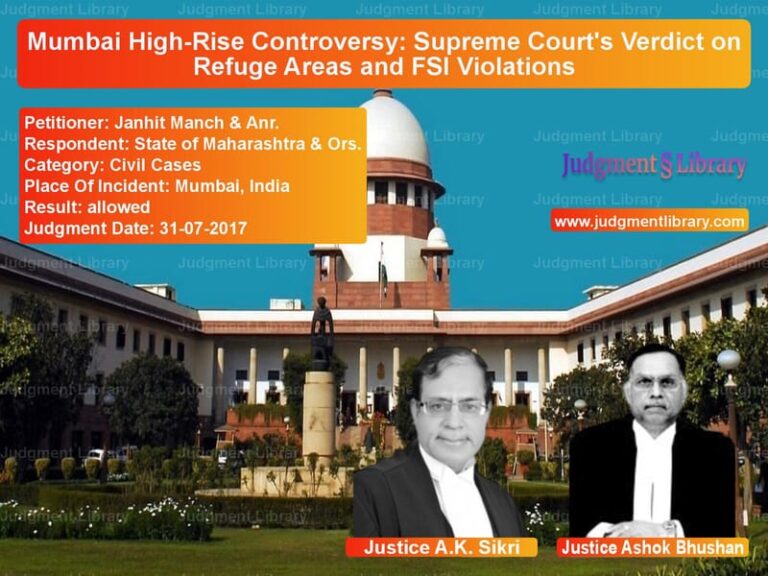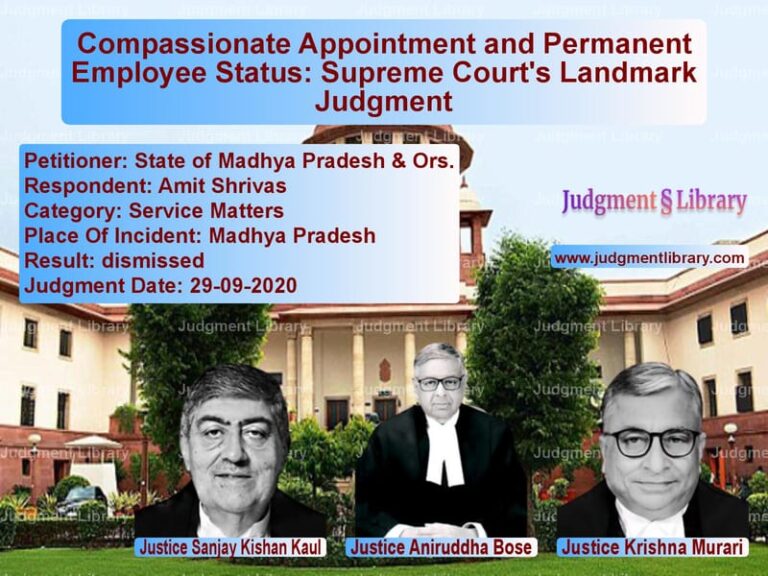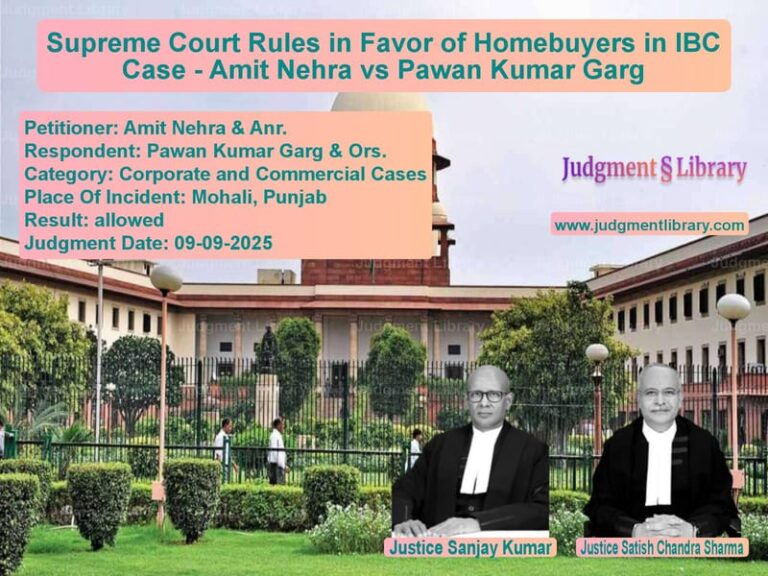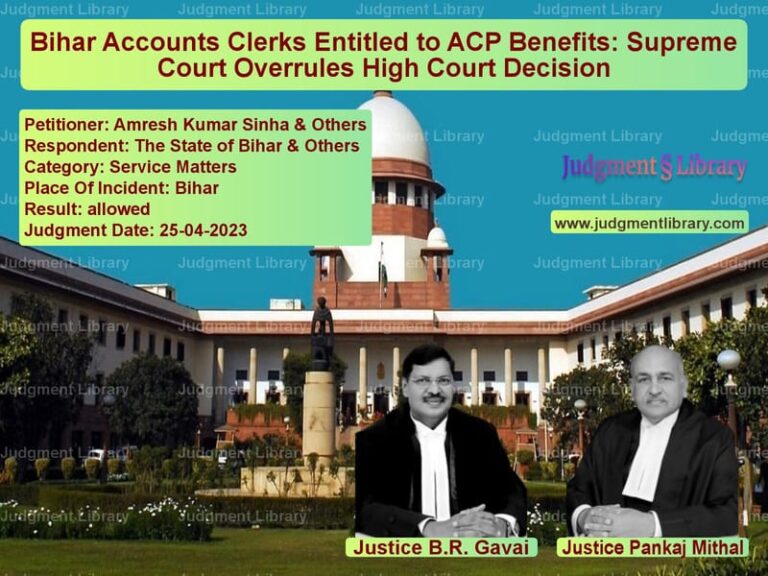DMK vs. Tamil Nadu Government: Supreme Court Verdict on Local Body Elections and Delimitation
The legal dispute between Dravida Munnetra Kazhagam (DMK) and the Tamil Nadu Government revolved around the conduct of local body elections in the state. DMK, a principal opposition party, alleged that the ruling party, AIADMK, was deliberately delaying elections and manipulating the delimitation process for political advantage. This case reached the Supreme Court, where the court had to determine whether the elections were being conducted fairly and in accordance with the constitutional mandate.
Background of the Case
DMK filed a civil appeal challenging a Madras High Court order that refused to issue directives to the Tamil Nadu State Election Commission (SEC) regarding the conduct of local body elections. The party argued that elections were being unconstitutionally postponed and that there was deliberate manipulation in the allocation of constituencies.
According to DMK, the Tamil Nadu Panchayats (Second Amendment) Act, 2016, which permitted the next cycle of local elections to be conducted based on the outdated 2001 Census, violated Articles 243-D and 243-T of the Constitution. These provisions require that elections be conducted based on the latest decadal Census, ensuring fair representation and reservation for Scheduled Castes and Scheduled Tribes (SC/ST) on a rotational basis.
Government’s Delimitation Process
Before the Supreme Court could decide on DMK’s challenge, the Tamil Nadu Government established a Delimitation Commission under the Tamil Nadu Delimitation Commission Act, 2017. This Commission undertook a fresh exercise to redraw ward boundaries, which culminated in the publication of a final recommendation on August 31, 2018. Following this, the government issued a notification on December 14, 2018, officially adopting the newly delimited wards as per the 2011 Census.
On February 20, 2019, the Commission also forwarded proposals for reservations, which were subsequently finalized through notifications in May 2019.
Legal Issues and Supreme Court Intervention
Despite these developments, a new issue arose when, on November 12, 2019, the Tamil Nadu Government issued another notification, restructuring four existing districts and creating nine new districts. This move disrupted the delimitation process, leading to confusion over whether elections could be conducted as planned.
In response to this, the State Election Commission (SEC) announced the schedule for local body elections on December 2, 2019. However, DMK challenged this notification, arguing that elections should not proceed until fresh delimitation was completed in the newly formed districts.
Arguments Presented in Court
DMK’s Arguments:
- The AIADMK-led government was manipulating the delimitation and reservation process to benefit politically.
- The elections should be conducted based on the 2011 Census, not the outdated 2001 Census.
- Fresh elections should not be held in the newly created nine districts until the proper delimitation process was completed.
- Any elections held without proper delimitation would be unconstitutional and against the democratic principles enshrined in the Constitution.
Government’s Defense:
- The delimitation exercise was already conducted and finalized as per the 2011 Census.
- The restructuring of districts did not affect the validity of the previously completed delimitation process.
- Postponing elections in the newly created districts would not impact elections in the rest of the state.
- Delays in elections would be against the constitutional mandate to ensure timely local governance.
Supreme Court’s Judgment
After considering the arguments, the Supreme Court ruled that:
- Local body elections should proceed in all districts except the newly created nine districts.
- The Tamil Nadu Delimitation Commission must complete a fresh delimitation exercise for the nine new districts before elections are held there.
- The elections in the remaining districts must be conducted with proportional reservations in accordance with the Tamil Nadu Panchayats (Reservation of Seats and Rotation of Reserved Seats) Rules, 1995.
The court observed:
“It is thus clear that the constitutional object of Part IX cannot be effectively achieved unless the delimitation exercise for constitution of local bodies at all levels is properly undertaken.”
The court further clarified that the legal mandate to hold elections does not override the necessity to ensure fairness and compliance with the Constitution:
“There is no identified data elucidating population proportions, and hence requisite reservation for Scheduled Castes and Scheduled Tribes cannot be provided for, both in village panchayat wards or Chairman/Vice-Chairman of District bodies.”
Key Takeaways from the Judgment
- The Supreme Court upheld the constitutional requirement for timely and fair elections while ensuring adherence to proper delimitation and reservation processes.
- It ruled that elections could proceed in districts where the delimitation process was already completed but must be postponed in newly created districts until fresh delimitation was undertaken.
- The judgment emphasized that elections cannot be manipulated for political advantage and must be conducted fairly as per the constitutional mandate.
Final Directions
The Supreme Court directed the Tamil Nadu State Election Commission to conduct elections immediately in all districts except the nine new districts. It also instructed the Delimitation Commission to complete fresh delimitation in the new districts within four months and conduct elections thereafter.
This ruling underscores the importance of constitutional integrity in the conduct of elections, ensuring that democratic processes are neither delayed unfairly nor manipulated to favor any political party.
Petitioner Name: Dravida Munnetra Kazhagam (DMK).Respondent Name: Secretary Governors Secretariat and Others.Judgment By: Justice S. A. Bobde, Justice B. R. Gavai, Justice Surya Kant.Place Of Incident: Tamil Nadu.Judgment Date: 06-12-2019.
Don’t miss out on the full details! Download the complete judgment in PDF format below and gain valuable insights instantly!
Download Judgment: Dravida Munnetra Kaz vs Secretary Governors Supreme Court of India Judgment Dated 06-12-2019.pdf
Direct Downlaod Judgment: Direct downlaod this Judgment
See all petitions in Public Interest Litigation
See all petitions in Legislative Powers
See all petitions in Constitution Interpretation
See all petitions in Fundamental Rights
See all petitions in Separation of Powers
See all petitions in Judgment by S. A. Bobde
See all petitions in Judgment by B R Gavai
See all petitions in Judgment by Surya Kant
See all petitions in partially allowed
See all petitions in supreme court of India judgments December 2019
See all petitions in 2019 judgments
See all posts in Election and Political Cases Category
See all allowed petitions in Election and Political Cases Category
See all Dismissed petitions in Election and Political Cases Category
See all partially allowed petitions in Election and Political Cases Category

